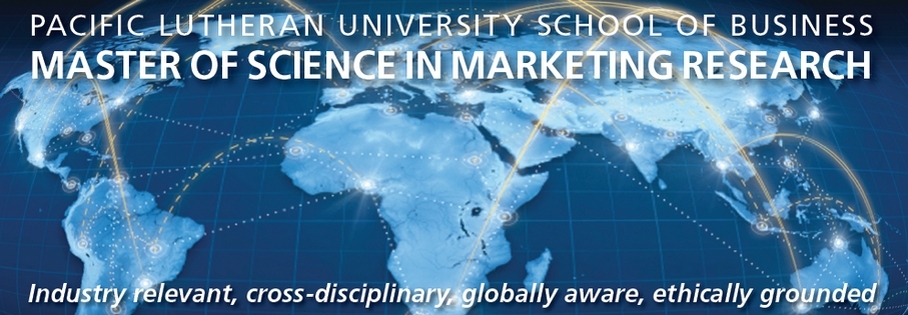Page 12 • (1,395 results in 0.018 seconds)
-
The PLU School of Business is a community of engaged faculty, staff & administrators who provide an excellent business education in a student-centered learning environment grounded in the liberal
Effective Communicators Students can write a well-organized and grammatically correct paper, memo, or case that is informative and professional Students can make an effective presentation that is informative and professional Think Critically Students can apply relevant information to a business problem and arrive at a well-reasoned conclusion Students can analyze and interpret quantitative data in decision making Have an Ethical Perspective Students can recognize ethical issues and recommend a course of
-

At Pacific Lutheran University, natural science research can lead students all the way to Antarctica and back again. For environmental studies majors, there’s also important data to collect and analyze within a stone’s throw of the university’s campus. Clover Creek flows 14 miles through Parkland,…
environmental studies majors, there’s also important data to collect and analyze within a stone’s throw of the university’s campus.Clover Creek flows 14 miles through Parkland, Joint Base Lewis-McChord (JBLM) and Lakewood before emptying into Lake Steilacoom. Its watershed spans 74 square miles. Much of the watershed’s stream system is impaired by low levels of dissolved oxygen, warm water temperatures and bacteria. State and county agencies are working with a coalition of local stakeholders to study and
-

Following PLU’s annual University Conference kick-off, our faculty members attended a number of breakout sessions, one of which was led by Teresa Ciabattari, chair of Women’s and Gender Studies and associate professor of Sociology. Here, Dr. Ciabattari helps us understand what we can do to…
more detailed analysis of the student experience across racial-ethnic categories. The good news from these data sources is that PLU students are satisfied with the academic climate on campus. They are satisfied with our academic excellence, course content, faculty knowledge and support, opportunity for intellectual growth, empowerment to learn and academic advising. The not-so-good news is that students of color, particularly African-American students, report lower levels of belonging to the PLU
-
The Army Historically Black Colleges and Universities and Minority-Serving Institutions (HBCU-MI) Student Program for Army Research and Knowledge (SPARK) is an undergraduate/graduate internship program for full-time HBCU and MI students in STEM fields. Under the guidance of government scientists and engineers, students will engage in…
Summer Research – Army HBCU-MI SPARK Posted by: nicolacs / October 29, 2024 October 29, 2024 The Army Historically Black Colleges and Universities and Minority-Serving Institutions (HBCU-MI) Student Program for Army Research and Knowledge (SPARK) is an undergraduate/graduate internship program for full-time HBCU and MI students in STEM fields. Under the guidance of government scientists and engineers, students will engage in Army mission-related research projects, including data analysis and
-
What is studying history all about at PLU? Traditionally, the discipline of history has focused on the critical analysis of text-based evidence from the past and seeks a detailed, complex
Mission StatementWhat is studying history all about at PLU? Traditionally, the discipline of history has focused on the critical analysis of text-based evidence from the past and seeks a detailed, complex understanding of individual and collective human behaviors as they have changed over time. PLU students of history develop lifelong habits of critical thinking, inquiry-based reading of texts, effective research and technical skills, and the appreciation of complexity and diversity in human
-

Master of Science in Marketing Research Degree Launches in Fall 2015 Pacific Lutheran University’s School of Business is accepting applications for the first cohort of its latest master’s degree, the Master of Science in Marketing Research (MSMR). The program will begin in September 2015, making…
relevant quantitative and qualitative marketing-research skills,” said Mari Peterson, director of the MSMR program. PLU’s MSMR program has been developed as a highly engaging, hands-on, full-time 10-month program, offered from September to June. PLU Marketing Research Professor Susan Harmon said the program will adhere to PLU’s distinct ethical and moral philosophies through coursework and community involvement. Each term, students will progress through courses that will broaden their capabilities and
-

TACOMA, WASH. (June 27, 2019) — Dr. Jon Grahe’s reach extends around the globe as an open science ambassador. Nearly a decade ago, Dr. Grahe declared that he wanted to change how we study social science. Because of his tireless efforts, a new approach to…
.” Dr. Grahe’s enthusiasm extends beyond simply testing competing theories within psychology, however. “Consider the benefits for undergraduate and graduate student training in quantitative methods accessing data representing diverse projects from multiple institutions across broad geographical regions,” he said. Dr. Jon Grahe The Collaboration Replications and Education Project (CREP) CREP (rhymes with “grape”), whose mission is to improve undergraduate training through crowdsourced replication
-
Want to learn more about UT Southwestern Medical Center Summer Undergraduate Research Fellowships (SURF)? SURF is one of five research intensive programs offered at UT Southwestern. Complete details can be found at www.utsouthwestem.edu/SURF . This website also provides links to: SURF-Stem Cell, Quantitative and Physical…
UT Southwestern Medical Center (SURF) Posted by: alemanem / October 6, 2020 October 6, 2020 Want to learn more about UT Southwestern Medical Center Summer Undergraduate Research Fellowships (SURF)? SURF is one of five research intensive programs offered at UT Southwestern. Complete details can be found at www.utsouthwestem.edu/SURF. This website also provides links to: SURF-Stem Cell, Quantitative and Physical Science (QP)-SURF, QP-SURF-Chemistry, and the Summer Undergraduate Research
-
The Colorado School of Mines Graduate Programs department offers MS (thesis and non-thesis options) and PhD degrees in Chemistry and Applied Chemistry. In addition, MS and PhD degrees are also offered in Geochemistry, Hydrological Sciences and Engineering, Materials Science, Nuclear Engineering, and Quantitative Biosciences and…
Chemistry Graduate Programs Colorado School of Mines Posted by: alemanem / November 10, 2020 November 10, 2020 The Colorado School of Mines Graduate Programs department offers MS (thesis and non-thesis options) and PhD degrees in Chemistry and Applied Chemistry. In addition, MS and PhD degrees are also offered in Geochemistry, Hydrological Sciences and Engineering, Materials Science, Nuclear Engineering, and Quantitative Biosciences and Engineering through interdisciplinary graduate programs
-

TACOMA, WASH. (Aug. 13, 2019) — Pacific Lutheran University’s Dr. Andrea Munro didn’t design Chem 103: Food Chemistry in order to teach students how to cook — but everyone agrees it’s been a pretty tasty side effect. Munro, an associate professor of chemistry, intended the…
,” Munro explained. “My department loves food and all the chemistry and the processing that goes into that, so there was a direct connection.”Interested in Chemistry?PLU’s Department of Chemistry has an outstanding curriculum, excellent faculty, great facilities and is accredited by the American Chemical Society.Both quantitative and quantitative analysis come into play, as Chem 103 students compare and contrast details like texture and taste while experimenting with the impacts of different
Do you have any feedback for us? If so, feel free to use our Feedback Form.


